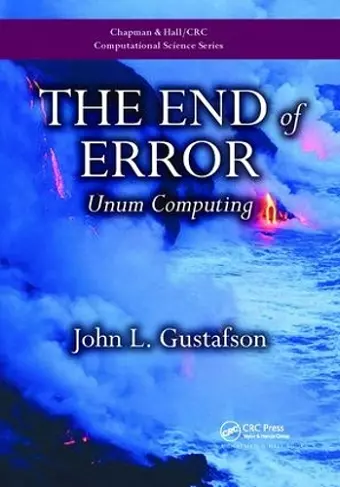The End of Error
Unum Computing
Format:Hardback
Publisher:Taylor & Francis Ltd
Published:27th Jul '17
Currently unavailable, and unfortunately no date known when it will be back
This hardback is available in another edition too:
- Paperback£61.99(9781482239867)

The Future of Numerical Computing
Written by one of the foremost experts in high-performance computing and the inventor of Gustafson‘s Law, The End of Error: Unum Computing explains a new approach to computer arithmetic: the universal number (unum). The unum encompasses all IEEE floating-point formats as well as fixed-point and exact integer arithmetic. This new number type obtains more accurate answers than floating-point arithmetic yet uses fewer bits in many cases, saving memory, bandwidth, energy, and power.
A Complete Revamp of Computer Arithmetic from the Ground Up
Richly illustrated in color, this groundbreaking book represents a fundamental change in how to perform calculations automatically. It illustrates how this novel approach can solve problems that have vexed engineers and scientists for decades, including problems that have been historically limited to serial processing.
Suitable for Anyone Using Computers for Calculations
The book is accessible to anyone who uses computers for technical calculations, with much of the book only requiring high school math. The author makes the mathematics interesting through numerous analogies. He clearly defines jargon and uses color-coded boxes for mathematical formulas, computer code, important descriptions, and exercises.
"The author of the present book believes that it is time to supplement the century-old floating point arithmetic with something better: unum arithmetic. The book covers various operations with unum arithmetic and topics like polynomial evaluation, solving equations, two-body problem, etc. The appendices give a glossary of unum functions, ubox functions, and some algorithm listings."
—Zentralblatt MATH 1320
"This book is an extraordinary reinvention of computer arithmetic and elementary numerical methods from the ground up. Unum arithmetic is an extension of floating point in which it is also possible to represent the open intervals between two floating point numbers. This leads to arithmetic that is algebraically much cleaner, without rounding error, overflow underflow, or negative zero, and with clean and consistent treatment of positive and negative infinity and NaN. These changes are not just marginal technical improvements. As the book fully demonstrates, they lead to what can only be described as a radical re-foundation of elementary numerical analysis, with new methods that are free of rounding error, fully parallelizable, fully portable, easier for programmers to master, and often more economical of memory, bandwidth, and power than comparable floating point methods. The book is exceptionally well written and produced and is illustrated on every page with full-color diagrams that perfectly communicate the material. Anyone interested in computer arithmetic or numerical methods must read this book. It is surely destined to be a classic."
—David Jefferson, Center for Advanced Scientific Computing, Lawrence Livermore National Laboratory
"John Gustafson’s book The End of Error presents the ideas of computer arithmetic in a very easy-to-read and understandable form. While the title is provocative, the content provides an illuminating discussion of the issues. The examples are engaging, well thought out, and simple to follow."
—Jack Dongarra, University Distinguished Professor, University of Tennessee
"John Gustafson presents a bold and brilliant proposal for a revolutionary number representation system, unum, for scientific (and potentially all other) computers. Unum’s main advantage is that computing with these numbers gives scientists the correct answer all the time. Gustafson is able to show that the universal number, or unum, encompasses all standard floating-point formats as well as fixed-point and exact integer arithmetic. The book is a call to action for the next stage: implementation and testing that would lead to wide-scale adoption."
—Gordon Bell, Researcher Emeritus, Microsoft Research
"Reading more and more in [John Gustafson’s] book became a big surprise. I had not expected such an elaborate and sound piece of work. It is hard to believe that a single person could develop so many nice ideas and put them together into a sketch of what perhaps might be the future of computing. Reading [this] book is fascinating."
—Ulrich Kulisch, Karlsruhe Institute of Technology, Germany
ISBN: 9781138402195
Dimensions: unknown
Weight: 960g
438 pages